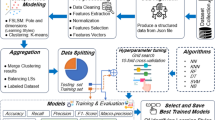Abstract
Learning style identification is important for improving the learning and teaching experience in the massive open online courses (MOOCs). To identify learning styles automatically, a very large quantity of labeled data is necessary. However, labeling data manually is tedious and impractical. A known solution to this problem is to cluster MOOCs learning data and label them with the general characteristics of the cluster to which they belong. In this paper, we propose two distance measures suitable for forming canopies in MOOCs, and incorporate the canopy approach into the K-means clustering algorithm. This improves the stability of the clustering results and the quality of the data labeling. Experimental results with four popular classifiers show that the proposed method can improve both the overall identification of learning styles and the identification of each individual learning style.
Access this chapter
Tax calculation will be finalised at checkout
Purchases are for personal use only
Similar content being viewed by others
References
Azzi, I., Jeghal, A., Radouane, A., Yahyaouy, A., Tairi, H.: A robust classification to predict learning styles in adaptive E-learning systems. Educ. Inf. Technol. 25(1), 437–448 (2019). https://doi.org/10.1007/s10639-019-09956-6
Blundo, C., Fenza, G., Fuccio, G., Loia, V., Orciuoli, F.: A time-driven FCA-based approach for identifying students’ dropout in MOOCs. Int. J. Intell. Syst. 37(4), 2683–2705 (2022)
El Aissaoui, O., El Alami El Madani, Y., Oughdir, L., El Allioui, Y.: A fuzzy classification approach for learning style prediction based on web mining technique in e-learning environments. Educ. Inf. Technol. 24(3), 1943–1959 (2018). https://doi.org/10.1007/s10639-018-9820-5
Fatahi, S., Moradi, H., Kashani-Vahid, L.: A survey of personality and learning styles models applied in virtual environments with emphasis on e-learning environments. Artif. Intell. Rev. 46(3), 413–429 (2016). https://doi.org/10.1007/s10462-016-9469-7
El Fazazi, H., Samadi, A., Qbadou, M., Mansouri, K., Elgarej, M.: A learning style identification approach in adaptive e-learning system. In: Rocha, Á., Serrhini, M. (eds.) Information Systems and Technologies to Support Learning. Smart Innovation, Systems and Technologies, vol. 111, pp. 82–89. Springer, Cham (2019). https://doi.org/10.1007/978-3-030-03577-8_10
Felder, R.M., Silverman, L.K.: Learning and teaching styles in engineering education. Engr. Education 78(7), 674–681 (1988)
Fournier-Viger, P. et al.: Pattern mining: current challenges and opportunities. In: Rage, U.K., Goyal, V., Reddy, P.K. (eds) DASFAA 2022 Workshops. LNCS, vol.13248, pp. 34–49 (2022). https://doi.org/10.1007/978-3-031-11217-1_3
Hmedna, B., El Mezouary, A., Baz, O.: A predictive model for the identification of learning styles in MOOC environments. Clust. Comput. 23(2), 1303–1328 (2019). https://doi.org/10.1007/s10586-019-02992-4
McCallum, A., Nigam, K., Ungar, L.H.: Efficient clustering of high-dimensional data sets with application to reference matching. In: Proceedings of the Sixth ACM SIGKDD International Conference on Knowledge Discovery and Data Mining, pp. 169–178 (2000)
Youssef, M., Mohammed, S., Hamada, E.K., Wafaa, B.F.: A predictive approach based on efficient feature selection and learning algorithms’ competition: case of learners’ dropout in MOOCs. Educ. Inf. Technol. 24(6), 3591–3618 (2019). https://doi.org/10.1007/s10639-019-09934-y
Ramadhan, E.R., Sutoyo, E., Musnansyah, A., Belgaman, H.A.: Analysis of hotspot data for drought clustering using K-means algorithm. In: Proceedings of the International Confer-ence on Engineering and Information Technology for Sustainable Industry, pp. 1–6 (2020)
Sheeba, T., Krishnan, R.: Prediction of student learning style using modified decision tree algorithm in e-learning system. In: Proceedings of the 2018 International Conference on Data Science and Information Technology, pp. 85–90 (2018)
Song, W., Yang, K.: Personalized Recommendation Based on Weighted Sequence Similarity. In: Wen, Z., Li, T. (eds.) Practical Applications of Intelligent Systems. Advances in Intelligent Systems and Computing, vol. 279, pp. 657–666. Springer, Heidelberg (2014). https://doi.org/10.1007/978-3-642-54927-4_62
Song, W., Ye, W., Fournier-Viger, P.: Mining sequential patterns with flexible constraints from MOOC data. Appl. Intell. (2022). https://doi.org/10.1007/s10489-021-03122-7
Su, Z., Song, W., Lin, M., Li, J.: Web text clustering for personalized E-learning based on maximal frequent itemsets. In: Proceedings of the 2008 International Conference on Com-puter Science and Software Engineering, pp. 452–455 (2008)
Yousef, A.M.F., Sumner, T.: Reflections on the last decade of MOOC research. Comput. Appl. Eng. Educ. 29(4), 648–665 (2021)
Acknowledgments
We thank Dr. Brahim Hmedna for providing the source code of the K-LS method and dataset for experimentation. This work was partially supported by the National Natural Science Foundation of China (61977001) and the Great Wall Scholar Program (CIT&TCD20190305).
Author information
Authors and Affiliations
Corresponding author
Editor information
Editors and Affiliations
Rights and permissions
Copyright information
© 2022 The Author(s), under exclusive license to Springer Nature Singapore Pte Ltd.
About this paper
Cite this paper
Song, W., Wang, Z. (2022). Improved Clustering Strategies for Learning Style Identification in Massive Open Online Courses. In: Tan, Y., Shi, Y. (eds) Data Mining and Big Data. DMBD 2022. Communications in Computer and Information Science, vol 1744. Springer, Singapore. https://doi.org/10.1007/978-981-19-9297-1_18
Download citation
DOI: https://doi.org/10.1007/978-981-19-9297-1_18
Published:
Publisher Name: Springer, Singapore
Print ISBN: 978-981-19-9296-4
Online ISBN: 978-981-19-9297-1
eBook Packages: Computer ScienceComputer Science (R0)





